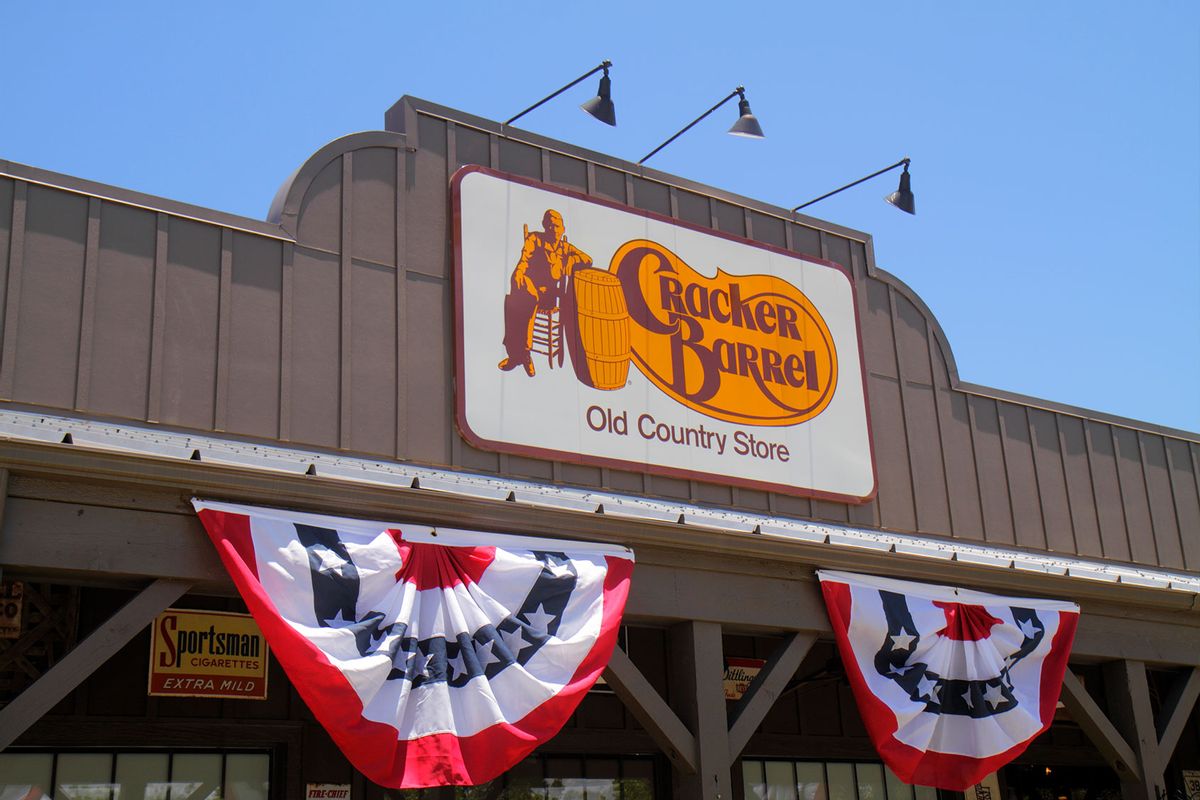Bright and early on a Monday morning, the Cracker Barrel Old Country Store unexpectedly ignited a culture war on social media.
It began with a two-sentence Facebook post: "Discover new meat frontiers. Experience the out of this world flavor of Impossible™ Sausage Made From Plants next time you Build Your Own Breakfast."
Below the caption was a photograph of a plate of cheesy hashbrown casserole, scrambled eggs and two sausage patties (which you likely wouldn't have known were vegan had one not been speared with a little toothpick flag bearing the Impossible logo).
All things considered, it was a fairly innocuous post. From Burger King's Impossible Whopper to KFC's vegan nuggets, chain restaurants and fast-food joints across the country have been adding plant-based options to their menus over the past few years. Some of Cracker Barrel's customers, however, bristled at the announcement, denouncing the new menu offering as alleged evidence of the chain caving to "wokeness."
"We don't eat in an old country store for woke burgers," one commenter wrote, while someone else added: "I just lost respect for a once great Tennessee company."
"Not going to happen!" another customer vowed. "Cracker Barrel use[d] to be so good, we looked forward to eating in them but not anymore."
Of course, as the laws of the internet seemingly dictate, those sincere expressions of outrage began to serve as a template for more ironic comments (at least I hope they were ironic) like "The fact that you sell stuff other than crackers in barrels is why I'll never go here again!!!!" and "YOU CAN TAKE MY PORK SAUSAGE WHEN YOU PRY IT FROM MY COLD, DEAD HANDS!!"
Another contribution to the conversation? "This is the future us leftists want. For the domain of all right winged red necks to turn on them and force veganism upon them," one woman wrote. "Next they'll be donating proceeds to BLM and trans youth. After that we're coming for Waffle House and Walmart. You've been warned. The revolution is nigh."
In and of itself, the back-and-forth is quite amusing, but it's also interesting to peel back the layers and ponder why social media users reacted the way they did to such a seemingly simple announcement. First, while veganism has become increasingly mainstream in America (especially over the past decade), it has long been positioned as "othered'' in the culture, a perception that was cemented during the countercultural movement of the '60s and '70s.
As I wrote in April, by changing how they ate, many young Americans rebelled against industrialization in the U.S., including within the military. Pre-industrial food, sans cans and plastics, like organic vegetables, sprouted grains and soy protein, became touchstones of the movement. This is something that is deeply explored in author Jonothan Kauffman's book "Hippie Food: How Back-to-the-Landers, Longhairs, and Revolutionaries Changed the Way We Eat."
"The idea that my personal food choices — what I buy, what I consume — can have these larger political impacts on global hunger, the environment and capitalism," Kauffman said in an interview with CUESA. "It was a huge shift."
The idea that "health food," including plant-based food, is for left-leaning hippies has managed to stick. Meanwhile, as the Wall Street Journal reported in 2014, demographic research shows that Cracker Barrel's average customer is more likely to be politically conservative.
"Experian Marketing Services does a rolling survey of thousands of people who patronize restaurants and retail establishments to determine, among other things, the politics of stores' customers," Reid J. Epstein wrote for the outlet. "Chain restaurants that score the highest on the conservative index are O'Charley's and Cracker Barrel. The most liberal: California Pizza Kitchen."
As such, the addition of vegan meat — and what it symbolizes to Cracker Barrel's longtime customer base — was bound to cause a clash, resulting in plenty of comments that borrow from the language of cable TV political discourse, such as "snowflake" and "wokeness." It's a disconcerting, if darkly humorous, example of the way that identity politics can play out in the most unexpected places, including under a Facebook post about vegan sausage.
Cracker Barrel, meanwhile, seems to be taking the controversy in stride.
"We appreciate the love our fans have for our all-day breakfast menu," the company told Nexstar in a statement. "At Cracker Barrel, we're always exploring opportunities to expand how our guests experience breakfast and provide choices to satisfy every taste bud — whether people want to stick with traditional favorites like bacon and sausage or are hungry for a new, nutritious plant-based option like Impossible Sausage."

Shares